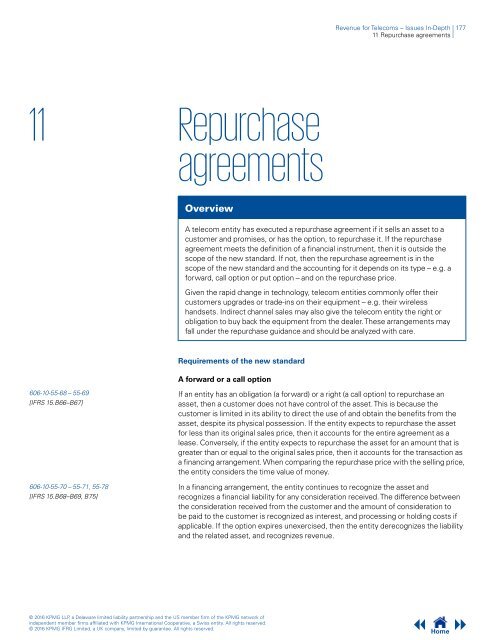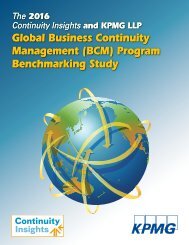Revenue for Telecoms
2cdncba
2cdncba
Create successful ePaper yourself
Turn your PDF publications into a flip-book with our unique Google optimized e-Paper software.
<strong>Revenue</strong> <strong>for</strong> <strong>Telecoms</strong> – Issues In-Depth | 177<br />
11 Repurchase agreements |<br />
11 Repurchase<br />
agreements<br />
Overview<br />
A telecom entity has executed a repurchase agreement if it sells an asset to a<br />
customer and promises, or has the option, to repurchase it. If the repurchase<br />
agreement meets the definition of a financial instrument, then it is outside the<br />
scope of the new standard. If not, then the repurchase agreement is in the<br />
scope of the new standard and the accounting <strong>for</strong> it depends on its type – e.g. a<br />
<strong>for</strong>ward, call option or put option – and on the repurchase price.<br />
Given the rapid change in technology, telecom entities commonly offer their<br />
customers upgrades or trade-ins on their equipment – e.g. their wireless<br />
handsets. Indirect channel sales may also give the telecom entity the right or<br />
obligation to buy back the equipment from the dealer. These arrangements may<br />
fall under the repurchase guidance and should be analyzed with care.<br />
Requirements of the new standard<br />
A <strong>for</strong>ward or a call option<br />
606-10-55-68 – 55-69<br />
[IFRS 15.B66–B67]<br />
606-10-55-70 – 55-71, 55-78<br />
[IFRS 15.B68–B69, B75]<br />
If an entity has an obligation (a <strong>for</strong>ward) or a right (a call option) to repurchase an<br />
asset, then a customer does not have control of the asset. This is because the<br />
customer is limited in its ability to direct the use of and obtain the benefits from the<br />
asset, despite its physical possession. If the entity expects to repurchase the asset<br />
<strong>for</strong> less than its original sales price, then it accounts <strong>for</strong> the entire agreement as a<br />
lease. Conversely, if the entity expects to repurchase the asset <strong>for</strong> an amount that is<br />
greater than or equal to the original sales price, then it accounts <strong>for</strong> the transaction as<br />
a financing arrangement. When comparing the repurchase price with the selling price,<br />
the entity considers the time value of money.<br />
In a financing arrangement, the entity continues to recognize the asset and<br />
recognizes a financial liability <strong>for</strong> any consideration received. The difference between<br />
the consideration received from the customer and the amount of consideration to<br />
be paid to the customer is recognized as interest, and processing or holding costs if<br />
applicable. If the option expires unexercised, then the entity derecognizes the liability<br />
and the related asset, and recognizes revenue.<br />
© 2016 KPMG LLP, a Delaware limited liability partnership and the US member firm of the KPMG network of<br />
independent member firms affiliated with KPMG International Cooperative, a Swiss entity. All rights reserved.<br />
© 2016 KPMG IFRG Limited, a UK company, limited by guarantee. All rights reserved.<br />
Home







